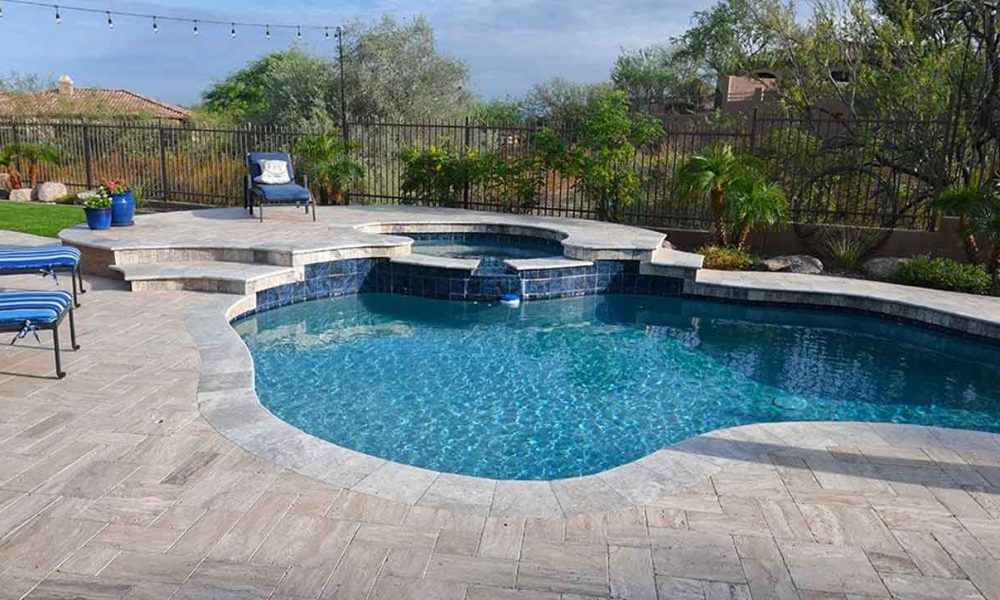Australia made headlines recently with its groundbreaking decision banning the use, production, and supply of engineered stones. This decision is expected to have a significant impact on various industries including the pool market, which is comparable to the United States’ pool industry.
After recognizing the risks associated with engineered stones, which are commonly used for swimming pool decks and patios, state and federal workplace ministries unanimously decided to take action. The material is known to release fine silica particles when cut. This dust can cause cancer and deadly diseases. The ban will be in effect from July 1, 2024. Victoria, Queensland and New South Wales are leading the way.
This decision was made to protect workers from silica dust hazards. Safe Work Australia revealed that silicosis, and other silica-related illnesses have increased significantly in recent years. This is especially true for engineered stone workers. Unions, businesses and even large retailers such as Bunnings and Ikea have all backed the ban.
Inhaling the dust of silica, a mineral that is found in earth’s crust poses well-known risks to health. When natural stones such as granite and sandstone are cut, crystalline silica is released into the air. This can lead to respiratory problems and lung scarring over time.
The federal government took the initiative to look into a possible customs ban on imported engineered stones, signaling its commitment to worker safety. This proactive approach raises the question of whether other countries such as Canada, the United States and European nations will follow Australia’s example.
Can a ban on engineered stone products have broader implications for the pool industry?
A similar ban in the United States would have a significant impact, considering its large pool market. Engineered stones are a popular option for many construction and home improvement applications. A ban on engineered stone could change the landscape of the industry, encouraging a shift to alternative materials and promoting innovation.
Supply Chain disruptions:
- Australia is an important exporter of a variety of materials, which includes engineered stone. An Australian ban could disrupt the global supply chains for these products and affect availability and price.
- Businesses in the United States that depend on engineered stone sourced from Australia may have difficulty securing a reliable supply chain.
Material Preferences Shift:
- The Australian ban is likely to affect consumer perceptions about the safety and sustainability engineered stone. The shift in perception may lead to a change in material choice among U.S. customers.
- In the U.S., businesses in the pool industry may see a shift towards materials perceived to be safer and more eco-friendly.
Californians evaluate emergency regulation regarding engineered stone products
It will be interesting to see how other countries respond as discussions in Australia unfold about possible transition periods and exemptions on existing engineered stone installation. Will they adopt the same measures to protect the health and wellbeing of their workers? The Australian ban has prompted reflection on the wider implications for industries around the world that heavily depend on engineered stones.
Californians are already addressing the issue. Cal OSHA is ready to vote on emergency regulation to protect workers who handle engineered stone. State workplace regulators have linked the material to a more aggressive and accelerated form of silicosis with a 19% fatality rate.
Artificial stone is a relatively recent and popular material on the U.S. hardscape market. It presents a unique risk to stonecutters. Cal/OSHA officials reveal that artificial stone may contain up to 93% silica. This is significantly more than natural stone.
Before 2010, there had been no silicosis reported in California. The Department of Public Health of California has identified 95 cases over the past five years. At least 10 of these cases have resulted in death. If harmful exposures continue, it is expected that hundreds more people will be diagnosed with the disease.
Cal/OSHA officials stress that many of California’s approximately 800 stone fabrication workshops, which are often small, do not have the resources to meet existing safety regulations. In response, Cal/OSHA is actively working on streamlining and strengthening rules to reduce the risk of exposure to silica, which has been associated with lung cancer as well as silicosis.
Dr. Sheiphali Ghandi, a UCSF occupational pulmonologist who served on a Cal/OSHA committee, calls the situation a “public disaster” and predicts that exposures in the past will continue to cause health problems. Gandhi said that the pending emergency regulations highlight the urgent need for U.S. to address the health hazards associated artificial stone. This is in line with global concerns and regulatory action.
The proposed emergency regulation will impose restrictions on dry cutting artificial stone containing more than 0.1% crystalline silicon and natural stone containing more than 10%. For activities like drilling or power cutting, wet-cutting tools or other alternatives that spray water on the surface of the material would be required to reduce dust emissions. Employers would also be required to provide workers with air purifying respirators and similar high-level protection masks.
The post How Could Australia’s Banning of Engineered Stone Products Affect The Pool Industry? first appeared on PoolMagazine.com. Get the Latest Pool News.





